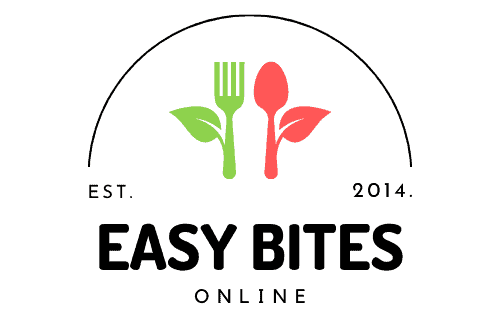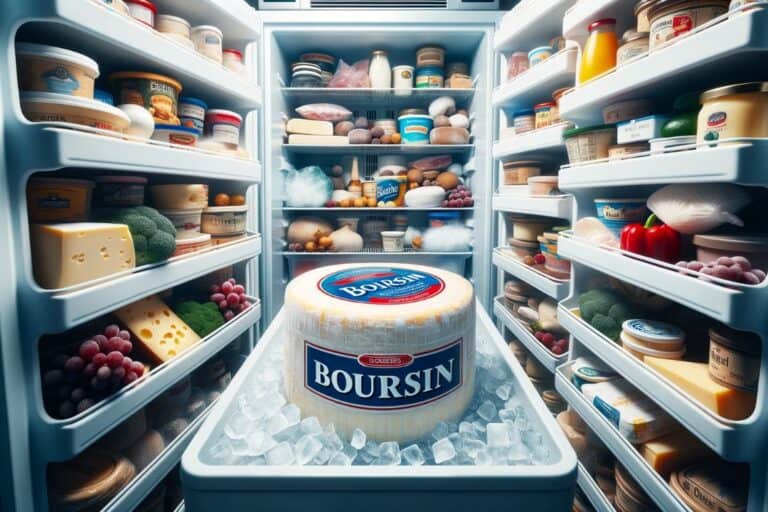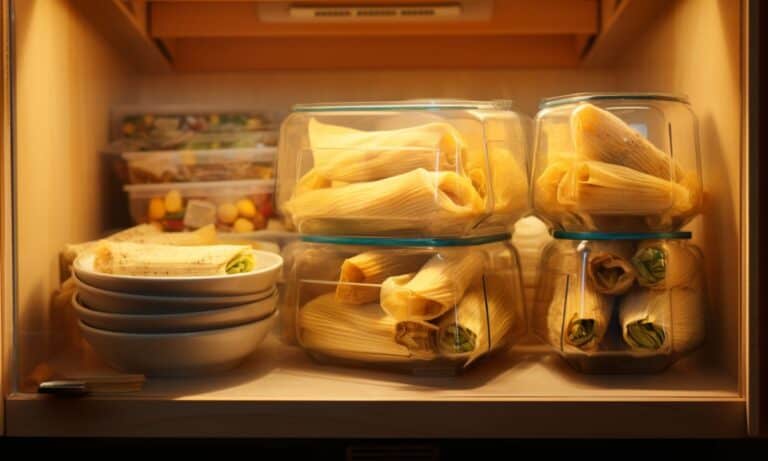Avoid These Foods That Cause Cough After Eating
Coughing episodes that erupt immediately or soon after meals can be more than a simple annoyance. Often accompanied by wheezing and difficulty breathing, these episodes may hint at underlying health complications.
These can range from dysphagia, involving trouble swallowing, to aspiration pneumonia, a severe condition that may also indicate asthma symptoms. action pneumonia, a severe condition that can also indicate asthma symptoms.
In addition, these episodes might be related to specific “foods that cause cough.” This suggests a potential allergic reaction or sensitivity to certain dietary components.
While not rare, chronic coughing is often overlooked and often dismissed as inconsequential despite the potential for complications and discomfort without a proper diagnosis.
Yet, for those who experience frequent coughing fits accompanied by chest tightness, wheezing, or phlegm production post-ingestion, it’s crucial to identify the dietary causes.
Additionally, if symptoms like dysphagia or discomfort in the lungs are present, these could also be indicative of problematic foods. This blog post delves into the specific foods that provoke chronic and frequent coughing.
The mechanisms behind such seemingly benign acts as swallowing can lead to dysphagia and can trigger discomfort, wheezing, and potentially respiratory distress.
Understanding these dietary triggers is vital to relieve frequent coughing and wheezing after eating. These symptoms may be related to dysphagia, known as swallowing difficulties.
It involves recognizing how certain foods interact with our body’s processes. These include laryngitis, circulatory collapse, and swallowing problems such as dysphagia and laryngopharyngeal reflux (LPR).
These conditions could necessitate medical diagnosis or intervention when ignored and may require help.
By exploring the cause of swallowing difficulties and the relationship between our consumption and dysphagia symptoms, we can tailor our meal choices. This helps mitigate risks and enhances overall well-being, which is often crucial.
Common Causes of Cough After Eating
Is he coughing after chowing down? It’s not just you. Let’s explore what causes post-meal issues, from spicy slip-ups to reflux woes. These can cause coughing and trouble swallowing, leading you to ENT doctors with chest discomfort.
Aspiration While Eating

Have we ever had a bit of food cause trouble by swallowing it down the wrong pipe? That’s an aspiration, and it’s a classic cough culprit. When we eat, our airways usually close off to prevent swallowing issues and keep food out, which can cause obstructions.
But sometimes, food particles can sneak into our breathing tubes, especially if we’re eating too quickly or not chewing properly.
- Small bits like crumbs are notorious for this.
- Liquids can also cause a sudden coughing fit.
GERD Symptoms Strike
Acid reflux isn’t just about heartburn; it can ambush your throat, American College of Allergy, Asthma, & Immunology. Gastroesophageal reflux disease (GERD) flares up when stomach acid takes a U-turn back up the esophagus. This irritates the lining and triggers that pesky cough.
- GERD is common – affecting about 20% of Americans.
- Persistent coughing post-meal could be a sign.
Spices Spark Irritation
Some like it hot – but your throat might not agree. Spicy foods pack a punch that can provoke your pipes into protest mode. And it’s not just the heat; certain spices irritate sensitive throats.
- Chili peppers often lead the fiery brigade.
- Even black pepper can have you reaching for water.
Heat Heightens Sensitivity
It’s not only spice that turns up the heat in your throat. Simply sipping something scalding can singe sensitive tissue and start a round of relentless coughing.
- Hot beverages are frequent offenders.
- Freshly microwaved foods deserve caution, too.
Postnasal Drama During Dining
Eating doesn’t just fill your belly; it also ramps up mucus production in some folks. If you’ve allergies or a sinus infection, dining can dial up postnasal drip big time. This excess gunk slides down the back of your throat and – you guessed it – sparks more coughing.
- Dairy products are often blamed for boosting mucus.
- Hydration helps thin out nasal secretions.
Navigating these nutritional no-gos is vital to keeping post-meal peace with your pipes. Remember:
- Chew carefully and take smaller bites to avoid aspiration.
- Watch out for those hidden spicy ingredients.
- Keep drinks cool enough to quench without scorching.
- Manage GERD with diet tweaks and maybe medication (talk to your doctor).
- Tackle postnasal drip by identifying triggers like certain foods or allergens.
By understanding what sets off your symptoms, you’ll be better equipped to sidestep these sneaky snack-time saboteurs and enjoy every last bite—without the unwanted cough concert afterward!
Foods Known to Trigger Coughing
Certain foods can spark a coughing fit. It’s crucial to know the culprits, from spicy dishes that irritate your throat to dairy products that ramp up mucus production.
Spicy Dishes Irritate
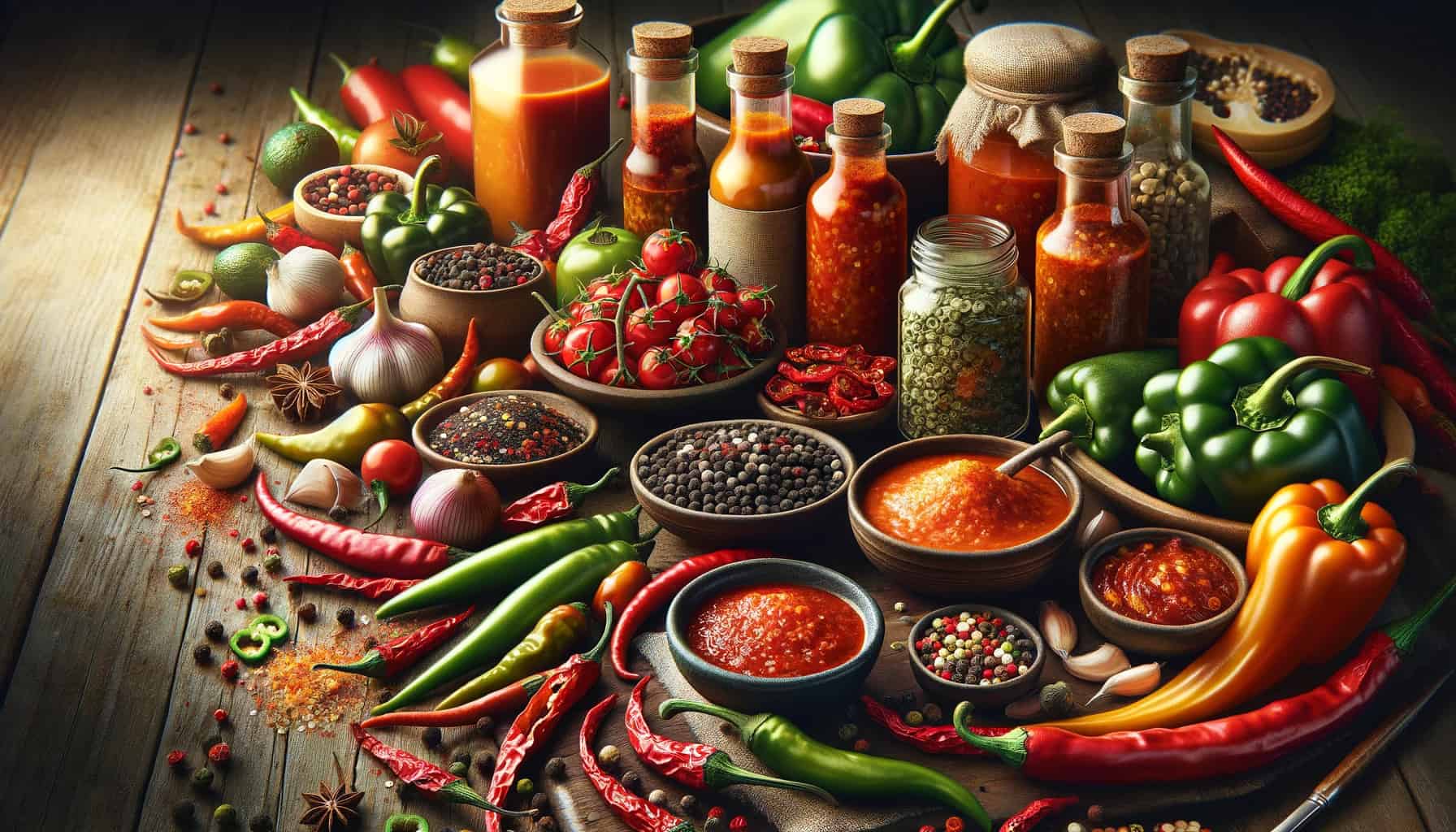
Have you ever had a dish so fiery it made you cough? That’s no coincidence. Spicy foods often contain capsaicin, which can irritate sensitive throat tissues. This irritation can feel like a tickle or burn, prompting a cough reflex.
- Common asthma triggers include hot peppers.
- Salsa and curries are frequent spicy suspects.
Dairy Thickens Mucus
Milk does a body good, right? Well, not always. Dairy products have a reputation for increasing mucus production in some people. This thicker mucus can cause you to clear your throat more often.
- Cheese and yogurt could be problematic.
- Symptoms might worsen for those with milk sensitivities.
Cold Drinks Cause Spasms
A chilled beverage might seem refreshing until your throat disagrees. Cold drinks can trigger spasms in the throat muscles. These spasms lead to sudden bouts of coughing as the body tries to warm and soothe the irritated area.
- Ice water is a common trigger.
- Frozen smoothies might also prompt coughs.
Fried Foods Aspire Grease
Fried chicken smells heavenly but may not feel so great going down. Greasy fried foods can lead to aspiration – tiny droplets of oil entering the airway instead of the stomach. This causes an immediate and sometimes severe cough response as your body attempts to expel these intruders.
- Fast food meals come with this risk.
- Homemade fried treats aren’t exempt, either.
Pickled Foods Acidity
Pickling preserves flavors, but at what cost? The acidity in pickled foods can be another trigger for that post-meal coughing spree. Vinegar and other acidic preservatives may provoke acid reflux symptoms, leading to a cough after eating them.
- Pickles and kimchi are acidic favorites.
- Salad dressings with a vinegar base could also be triggers.
Fruits & Vegetables Surprises

Not all healthy choices are safe from causing a hack fest! Some fruits and vegetables contain histamines or other compounds that could act as triggers for sensitive individuals:
Examples include:
- Bananas
- Avocados
- Eggplants
- Tomatoes
Stats show certain people react more strongly than others due to allergies or intolerances related to these foods’ natural chemicals. Always consider personal reactions over general advice when it comes to diet-related triggers!
Acid Reflux: A Primary Culprit
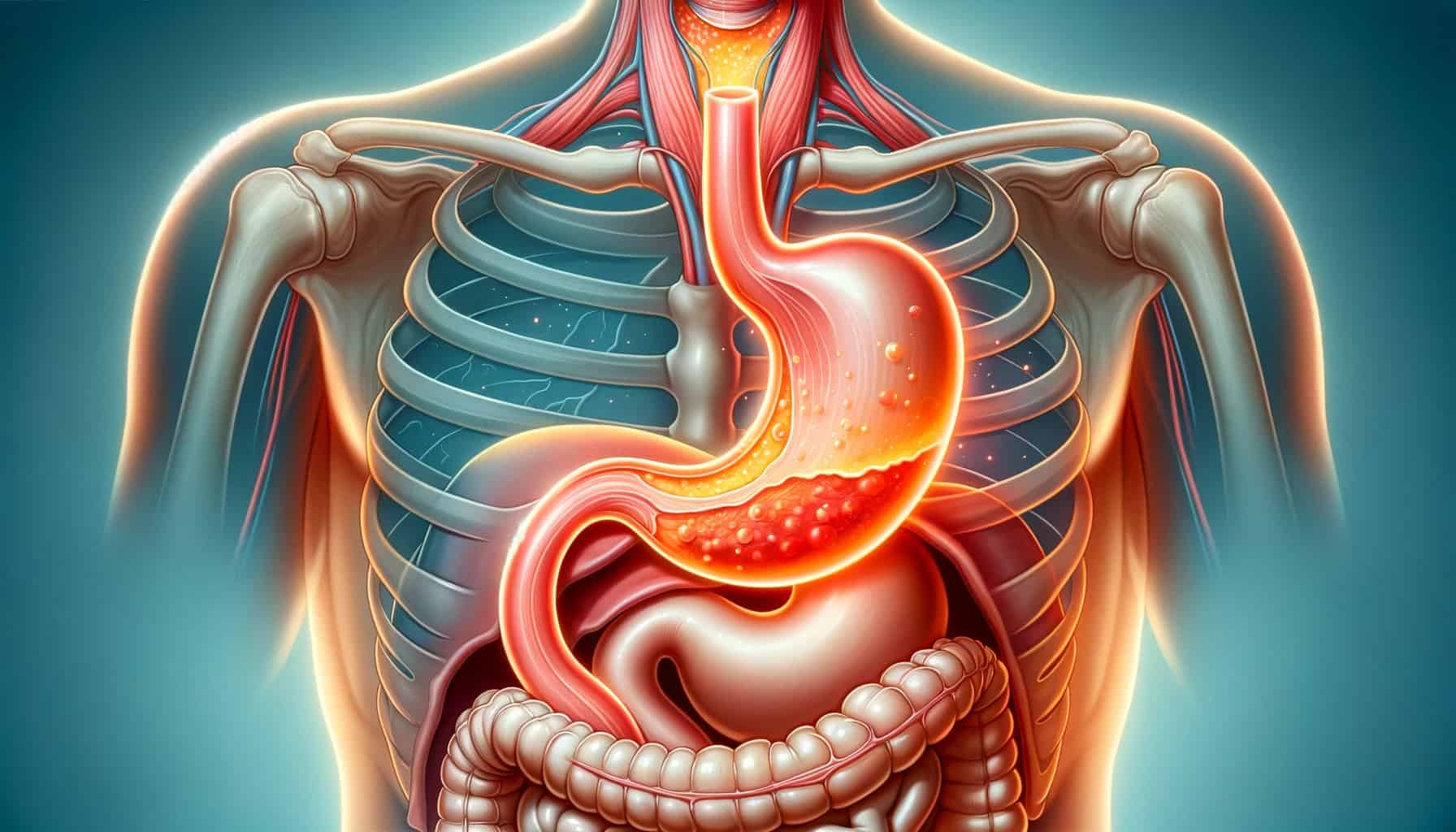
Acid reflux often leads to coughing post-meal. It’s due to stomach acid reaching the esophagus.
Stomach Acid Irritation
When you chow down, your stomach gets to work. But sometimes, it overdoes it with acid production. This isn’t some internal workout gone wrong – it’s your body reacting to what you’ve eaten. And if that stomach acid decides to hitch a ride up your food pipe? Hello, irritation! It’s like an unwelcome guest at a party in your throat.
This isn’t just a one-off thing, either. For folks with gastroesophageal reflux disease (GERD), this is the daily grind. The lining of their esophagus throws up the white flag when acid comes knocking, leading to that annoying cough.
Lying Down Worsens Symptoms
Here’s a pro tip: don’t hit the sack right after eating. Gravity’s not just a fantastic movie; it also keeps your stomach contents down where they belong.
When you lie down, you’re rolling out the red carpet for acid regurgitation. Your esophagus doesn’t have those comfy stomach linings, so it can’t handle the burn.
Overeating and Reflux Risk
Think of your stomach as a bag that can only hold so much grocery. There are too many items in there, and something has to give – usually upwards and into areas no grocery should go! Overeating is like sending an open invite for reflux to crash your party.
Foods Weakening Esophageal Sphincter
Some foods are smooth talkers; they sweet-talk the lower esophageal sphincter into relaxing when it should be on high alert. These culprits include:
- Chocolate (sadly)
- Fried or fatty goodies
- Coffee (even sadder)
- Alcohol (the lowest)
Once these gatekeeper muscles relax, acid from your stomach thinks it’s got an all-access pass to your throat.
Let’s get real here for a second: avoiding these troublemakers might seem like saying goodbye to life’s finer things, but think about it – is a temporary pleasure worth a coughing concert after every meal?
To sum up this whole shindig:
- Stomach acids pulling an encore in your food pipe equals significant irritation.
- Are you sleeping straight after snacking? Bad idea.
- More food than necessary equals a greater risk of unwanted encores.
- Some eat convince your bodyguards (aka sphincters) to slack off.
Food Allergies and Respiratory Reactions
Eating certain foods can trigger allergic reactions, leading to coughing. This is due to histamine release, which affects the respiratory system.
Allergic Reaction Coughing
Allergies are no joke. They can mess with your whole day. Your body goes into defense mode when you eat something you’re allergic to. It thinks it’s under attack! So what does it do? Releases histamine like crazy. And this little chemical? It’s a big reason you can’t shake off that cough after chowing down on some grub.
Histamine’s job is to eliminate allergens, but sometimes it goes overboard. That’s when things like coughing start happening. Your airways are inflamed and narrow because histamine tells them to tighten up. It’s not cool when you’re trying to enjoy a meal.
Common Food Culprits
Let’s talk about troublemakers in the food world:
- Nuts: Love them or hate them; they can cause trouble.
- Shellfish: Shrimp cocktail, anyone? It’s more like shrimp “cough-tail” for some folks.
- Eggs: Breakfast staple turned into a breathing battle for some unlucky eaters.
- Soy: It’s in everything, but not everyone says, “Soy, oh boy!”
These guys are notorious for stirring up allergies and making people cough after eating. If your body sees them as enemies, it’ll launch an allergic reaction faster than you can say, “Pass the antihistamines.”
Anaphylaxis Alert
Now we’re getting serious. Anaphylaxis isn’t just about coughing; it’s life-threatening stuff here:
- Difficulty breathing
- Airways slamming shut
- Wheezing like there’s no tomorrow
- Your respiratory tract is freaking out
If any of this happens after eating those allergy-trigger foods, we’re talking emergency time—like call 911 pronto.
Anaphylaxis includes a nasty cough because your lungs are trying to keep air moving despite everything closing up shop. And if that wasn’t bad enough, there could be other asthma symptoms tagging along, too.
Asthma Attack Risks
Speaking of asthma symptoms:
- Wheezing ramps up
- Breathing becomes a workout session
- Airways put on their cranky pants and swell up
This is more than just a slight post-meal cough; it’s an asthma attack waiting to happen if you’ve got asthma and hit those allergen-laden foods hard.
Food allergies messing with your respiratory system is serious business:
- Histamine plays defense (and goes overboard).
- Foods become foes (nuts, shellfish—you name it).
- Anaphylaxis enters the chat (and brings all its dangerous friends).
Stay alert for signs of respiratory infections or worse—respiratory failure—if allergies go unchecked during an asthma attack or severe allergic reaction.
So remember:
- Food allergies = potential cough fest.
- Know your enemy (those pesky allergen foods).
- Watch out for scary anaphylaxis signs.
- Asthma + food allergies = double trouble.
Keep those inhalers and epinephrine pens closer if you’ve got food allergies and asthma playing tag team against your lungs!
Dietary Adjustments for Preventing Cough
To mitigate cough after eating, certain dietary changes are essential. Smaller meals and specific food exclusions can significantly reduce the risk of a post-meal cough.
Smaller Frequent Meals
Eating smaller amounts more often can ease your digestive system. It’s a simple tweak with significant benefits. Large meals might overfill your stomach, pushing acid into your throat and triggering a cough. This is particularly true if you’re prone to acid reflux or gastroesophageal reflux disease (GERD).
- Pros: Less pressure on the esophageal sphincter, reduced heartburn.
- Cons: Requires more meal planning throughout the day.
Cut Out Trigger Foods
Specific treats are troublemakers for your esophagus. Chocolate, caffeine-packed drinks, and acidic edibles can weaken the lower esophageal sphincter. That valve keeps stomach contents where they belong when they slack off; hello, cough!
- Examples:
- Soft drinks
- Coffee and tea
- Tomatoes and citrus fruits
Avoiding these can be tough, but think about how much better you’ll feel.
Alkaline Food Incorporation
Alkaline foods are like peacekeepers in your belly—they help keep acidity in check. Balancing stomach acid levels may prevent irritation that leads to coughing fits after meals.
- Options:
- Leafy greens
- Nuts like almonds
- Bananas and melons
These choices not only combat acidity but also pack a nutritional punch.
Stay Hydrated Always
Water is a multitasker—it quenches thirst and clears irritants from your throat. Adequate hydration ensures that any potential irritants are washed away before they can cause trouble.
- Benefits:
- Helps digestion
- Clears mucus
- Soothes the throat lining
Remember to sip water throughout the day rather than chugging large amounts at once.
Treatment Options for Chronic Cough
Chronic cough can be a nuisance, but several treatment options exist. Finding the right solution requires patience and care, from acid blockers to speech therapy.
Acid Reflux Solutions
Individuals with chronic coughing caused by acid reflux may find relief through antacids and H2 blockers. These medications reduce stomach acidity, preventing the upward flow that irritates the throat and triggers coughing.
- Antacids neutralize existing stomach acid.
- H2 blockers decrease future acid production.
Asthma Management
Asthma-related chronic cough often responds well to inhalers or steroids. These treatments target inflammation in the airways, easing breathing and reducing cough frequency.
- Inhalers provide quick-relief bronchodilators.
- Steroids offer long-term inflammation control.
Diet Overhaul
An elimination diet is instrumental in pinpointing food triggers for excessive phlegm production and chronic condition flare-ups. By systematically removing potential culprits from meals:
- Identifies specific foods causing issues.
- It helps tailor a personalized diet plan.
Swallowing Strength Training
Speech therapy techniques aren’t just for speaking—they also strengthen swallowing muscles. This can minimize chest infections by enhancing the body’s ability to clear food particles effectively.
- Exercise improves muscle coordination.
- Techniques reduce aspiration risk during eating.
Managing Diet-Related Cough
Understanding the complex relationship between diet and respiratory symptoms is crucial for individuals who experience coughing after eating. Identifying and avoiding specific foods that trigger coughing can significantly reduce the frequency and severity of such episodes.
Maintaining a food diary to pinpoint potential dietary culprits and discussing findings with a healthcare professional who can provide personalized advice based on expert knowledge is advisable.
Implementing dietary adjustments may require patience and persistence, but it is vital to better health. For those suffering from chronic coughs linked to diet, seeking medical treatment should be a priority.
Remember that managing your diet alleviates symptoms and contributes to overall well-being. If persistent cough after eating disrupts your quality of life, consult a dietician or a medical expert to explore further treatment options and lifestyle modifications.
FAQ: Foods That Cause Cough
What are the most common causes of a cough related to food?
👉 The most common causes include food allergies, acid reflux (such as silent reflux and symptoms of GERD), and irritation from certain types of food. Foods high in sugar or fatty acids can aggravate chronic bronchitis or obstructive pulmonary disease (COPD), leading to a cough.
Can certain foods help soothe a sore throat and cough?
👉 Foods like chicken soup, pomegranate juice, and orange juice are rich in vitamin C and essential nutrients with anti-inflammatory properties. These can help soothe a sore throat, alleviate cold symptoms, and support the body’s immune system.
Warm beverages like lemon juice in hot water and raw honey are also effective home remedies.
Are there any foods that should be avoided if I have a chronic cough?
👉 Avoiding cold foods, fatty foods, and high sugar consumption is a good idea if you have a chronic cough, especially in chronic diseases like chronic bronchitis or COPD. These can increase inflammation and exacerbate symptoms.
How can food allergies contribute to coughing?
👉 Food allergies can cause inflammation in nasal passages and the throat, leading to irritation and cough. It can also cause a dry cough, stuffy nose, and shortness of breath in severe cases. Blood tests by a medical professional can help identify specific food allergies.
Is it possible for diet to affect respiratory conditions like chronic obstructive pulmonary disease?
👉 A healthy diet is crucial in managing chronic diseases like COPD. For instance, foods rich in fatty acids can increase the risk of flare-ups. A diet rich in essential nutrients, vitamins like vitamin D, and anti-inflammatory foods is recommended.
What should I do if I experience a cough after eating?
👉 If you frequently experience a cough after eating, it’s a good idea to consult a medical professional or an ENT doctor. This could indicate an underlying cause like silent reflux, food allergy, or chronic diseases. In some cases, speech-language pathologists may be involved if there are signs of dysphagia.
Can vitamin C from foods like orange juice help with a cough?
👉 Vitamin C from sources like orange juice has health benefits that can boost the immune system and help fight infections like the cold virus. However, seeking medical advice for persistent coughs is essential to rule out severe conditions like heart disease or upper respiratory infections.
Do health organizations recommend any specific foods for cough relief?
👉 Organizations like the Mayo Clinic recommend staying hydrated and consuming warm fluids like chicken soup, lemon juice in hot water, and herbal teas. They also suggest honey, especially raw honey, for its soothing and anti-inflammatory properties.
However, they advise against alcohol consumption and certain cold foods that can worsen a cough.
Q9: Does a change in diet help with chronic diseases causing a cough?
👉 Diet modifications can be beneficial in managing chronic diseases that cause coughing, like chronic bronchitis or COPD. A diet low in inflammatory foods and rich in vitamins and essential nutrients can help reduce symptoms and support overall health.
Can cough drops or natural remedies be supplemented with specific foods for cough relief?
👉 Combining cough drops or natural remedies with foods with anti-inflammatory properties and health benefits can effectively relieve a cough. However, it’s crucial to understand the root causes of the cough and seek medical advice in cases of severe or persistent symptoms. anaphylaxis

Born and raised in a family of foodies, Georgia’s passion for cuisine was nurtured from a young age as she learned the intricacies of flavor and texture from her grandmother’s kitchen. As an adult, this early fascination blossomed into a full-fledged love affair with the culinary world.
